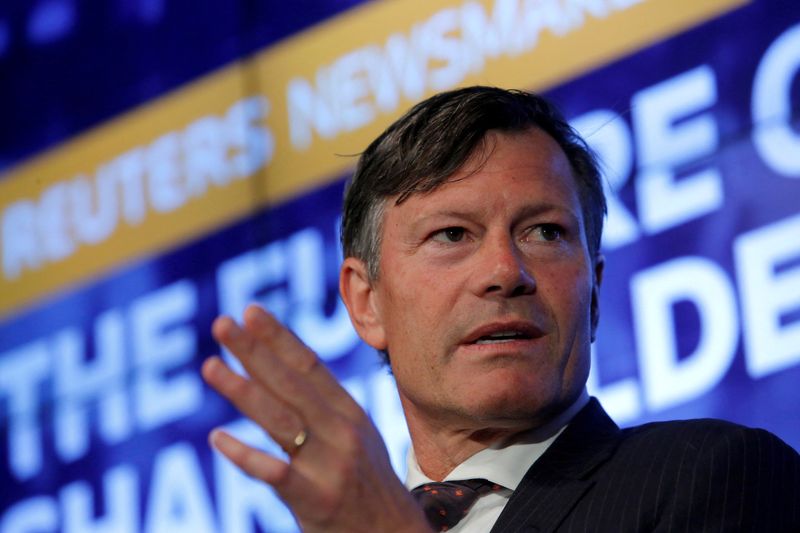By Svea Herbst-Bayliss
NEW YORK (Reuters) -Jeff Ubben, one of Wall Street's most prominent activist investors, is shutting down Inclusive Capital Partners three years after starting the firm designed to focus on social investing.
Ubben told investors in a memo he was winding down some funds and returning capital, two people familiar with the matter said on Wednesday.
Ubben and Inclusive Capital, known as InCap, did not respond to calls and emails for comment.
The closure of InCap comes as hedge funds struggle to raise new cash, and as a number of prominent investors have been wrong-footed by markets gyrating on speculation about interest rate moves, fears about inflation and geopolitical turmoil.
Last year more hedge funds closed their doors than launched, data from Hedge Fund Research show.
More than two decades ago, Ubben, 61, who started his career at mutual fund giant Fidelity, founded ValueAct Capital in San Francisco. Since 2000 he established himself and the firm as a powerful but friendly investor more interested in working behind the scenes with target companies than pushing for change in public on television or at conferences.
ValueAct, which invested as much as $20 billion over the years, took stakes in companies ranging from Microsoft (NASDAQ:MSFT) to Martha Stewart Living Omnimedia, and a handful of its top executives, including Ubben, sat on numerous corporate boards.
After having spent years planning for an orderly succession at ValueAct and at an age many investors might think of retiring, Ubben launched InCap in 2020.
The Wall Street Journal first reported that InCap is returning capital to investors.
The firm was designed as an environmental and social impact investor that would put money into companies whose businesses address societal needs. At the time, Ubben said pushing firms to address environmental and social issues could have big payoffs and the firm was trying to raise as much as $10 billion.
In 2021, InCap invested in Exxon (NYSE:XOM) and Ubben joined the board as the oil company was facing a board challenge from startup hedge fund Engine No. 1.
Investors voted to replace three directors with Engine No. 1 candidates but Ubben kept his seat.
In a regulatory filing, InCap said on Wednesday it was selling two million shares in Exxon worth $216 million, suggesting the firm was making big changes to its portfolio.
Despite Ubben's strong reputation, people familiar with InCap's fund raising efforts said it has been tough to raise cash and noted that investor tastes, especially when it came to environmental, social and governance issues (ESG), have shifted. With markets tumbling last year, many investors simply wanted to see returns instead of focusing on ESG issues.
Additionally some of InCap's public investments have lost money, people familiar with the portfolio said, noting that there where also winners and some private investments that buoyed the portfolio.

This year a handful of the firm's biggest investments, including specialty chemicals company Ingevity (NYSE:NGVT), Bio Rad Laboratories, Unifi (NYSE:UFI) Inc which manufactures and sells recycled products, wood pellets maker Enviva (NYSE:EVA) and German pharmaceutical and biotech Bayer (OTC:BAYRY) are nursing double digit losses.
A number of prominent hedge fund managers who have returned capital to outside investors over the last years, including John Paulson and Louis Bacon, have continued to invest their own fortunes through family office structures.